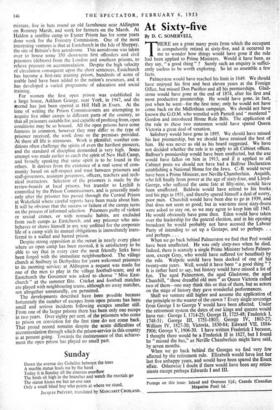At Sixty-five
By D. C. SOMERVELL,_
THERE are a great many posts from which the occupant is compulsorily retired at sixty-five, and it occurred to me to wonder how things would have gone if the rule had been applied to Prime Ministers. Would it have been, as they say, " a good thing " ? Surely such an enquiry is suffici- ently useless to be worth exploring.- So let us assemble a few facts.
Palmerston would have reached his limit in 1849. We should have enjoyed his first and best -eleven years at the Foreign Office, but missed Don Pacifico and all his premierships. Glad- stone would have gone at the end of 1874, after his first and most productive premiership. He would have gone, in fact, just when he went—for the first time; only he would not have come back on the Midlothian campaign. We should not have known the G.O.M. who wrestled with Parnell and " murdered " Gordon and introduced Home Rule Bills. The application of the rule to these two statesmen would have spared Queen Victoria a -great deal of vexation.
Salisbury would have _gone in 1895. We should have missed his last premiership, but we should have retained the best of him. He was never as old as his beard suggested. We have not decided whether the -rule is to apply to all Cabinet offices. Baffour's premiership would have been unaffected, but the axe would have fallen on him in 1913, and flit applied to all Cabinet posts we should not have had a Bantu Declaration establishing a National Home for the Jews. C.-B. would never have been a Prime Minister, nor Neville Chamberlain. Asquith, who fell finally from power at the age of sixty-four, and Lloyd- George, who suffered the same fate at fifty-nine, would have been unaffected. Baldwin would have retired to his books and his pigs in 1931, and thereby spared himself a deal of worry, poor man. Churchill would have been due to go in 1939, and that does not seem so good; but in war-time most sixty-fivers were asked to stay on, so we may agree to keep him till 1945. He would obviously have gone then. Eden would have taken over the leadership for the general election, and in his opening broadcast he would probably not have accused the Labour Party of intending to set up a Gestapo, and so perhaps.. . and perhaps. . . .
When we go back behind Palmerston we find that Peel would have been unaffected. He was only sixty-two when he died. Indeed, there is scarcely a single Prime Minister before Palmer- ston, except Grey, who would have suffered (or benefited) by the rule. Walpole would have been docked of one of his twenty-one years. Well, would it have been " a good thing " ? It is rather hard to say, but history would have missed a lot of fun. The aged Palmerston, the aged Gladstone, the aged Churchill, " those dreadful old men " as Queen Victoria called two of them—one may think this or that of them, but as actors on the stage of history they gave wonderful performances.
Shall we venture still higher and assume the application of the principle to the wearer of the crown ? Every single sovereign from George I to George .V would have been affected. Under the retirement system the dates o£ our kings and queens would have run : George I, 1714-25; George II, 172548; Frederick I, 1748-51; George III, 1751-1803; George IV, 1803-27; William IV, 1827-30; Victoria, 1830-84; Edward VII, 1884- f906; George V, 1906-30. I have written Frederick I because, I thought there would be a Frederick II in 1827, but I found he "missed the bus," as Neville Chamberlain might have said, by seven, months. When we go back behind the Georges we find very few affected by the retirement rule. Elizabeth would have lost her last five unhappy years, and would have been spared the Essex affair. Otherwise I doubt if there would have been any retires nients except perhaps Edwards I and III.


































 Previous page
Previous page